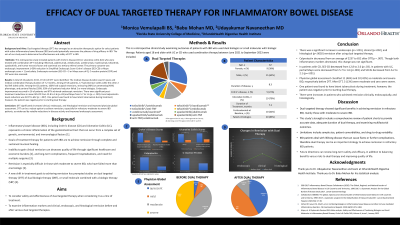Monday Poster Session
Category: IBD
P2557 - Efficacy of Dual Targeted Therapy for Inflammatory Bowel Disease
Monday, October 28, 2024
10:30 AM - 4:00 PM ET
Location: Exhibit Hall E

Has Audio

Monica Vemulapalli
Florida State University
Orlando, FL
Presenting Author(s)
Monica Vemulapalli, 1, Babu Mohan, MD2, Udaykumar Navaneethan, MD3
1Florida State University, Orlando, FL; 2Orlando Gastroenterology PA, Orlando, FL; 3Orlando Health, Digestive Health Institute, Orlando, FL
Introduction: Dual targeted therapy (DTT) has emerged as an attractive therapeutic option for select patients with active inflammatory bowel disease (IBD) and could potentially overcome the plateau of drug efficacy in IBD. The aim of our study was to determine the effectiveness and safety of DTT in IBD.
Methods: This retrospective study included patients with Crohn’s disease (CD) or ulcerative colitis (UC) who were treated with combination DTT including infliximab, adalimumab, vedolizumab, ustekinumab, riskankizumab, tofacitinib, upadacitinib, and ozanimod at a tertiary referral center. The primary outcome was endoscopic improvement ( >50% reduction in Simplified Endoscopic Score-Crohn's disease [SES-CD] or Mayo endoscopic score < 1) and safety. Endoscopic remission (SES-CD < 3 or Mayo score of 0), C-reactive protein (CRP) and FCP were also assessed.
Results: A total of 24 patients (5 CD, 19 UC) of DTT were identified. The median disease duration was 8.3 years and median combination therapy duration of 7.2 months. Among 19 UC patients, 17 had extensive colitis while the other 2 had left sided colitis. Among the CD patients, 100% had surgical resections, stricturing (40%) or penetrating (40%) phenotype, and perianal fistulas (20%). 83% of all patients had prior failed 2 or more biologics. Endoscopic improvement occurred in 16 of patients and 67% achieved endoscopic remission. There were significant post-treatment reductions in mean SES-CD from 12.8 to 2.6 (p=.03) and Mayo from 5.7 to 1.6 (p =< .001). Fecal calprotectin levels reduction was 2237 to 652 (p = .007). One patient was found to have latent tuberculosis during treatment; however, the patient was negative prior to starting dual therapy.
Discussion: DTT significantly increased clinical, endoscopic, and histological remission and improved physician global assessment. DTT can be a robust option to achieve remission, especially for refractory moderate to severe IBD patients, as evidenced by notable reductions in disease activity and improved endoscopic assessment.
Note: The table for this abstract can be viewed in the ePoster Gallery section of the ACG 2024 ePoster Site or in The American Journal of Gastroenterology's abstract supplement issue, both of which will be available starting October 27, 2024.
Disclosures:
Monica Vemulapalli, 1, Babu Mohan, MD2, Udaykumar Navaneethan, MD3. P2557 - Efficacy of Dual Targeted Therapy for Inflammatory Bowel Disease, ACG 2024 Annual Scientific Meeting Abstracts. Philadelphia, PA: American College of Gastroenterology.
1Florida State University, Orlando, FL; 2Orlando Gastroenterology PA, Orlando, FL; 3Orlando Health, Digestive Health Institute, Orlando, FL
Introduction: Dual targeted therapy (DTT) has emerged as an attractive therapeutic option for select patients with active inflammatory bowel disease (IBD) and could potentially overcome the plateau of drug efficacy in IBD. The aim of our study was to determine the effectiveness and safety of DTT in IBD.
Methods: This retrospective study included patients with Crohn’s disease (CD) or ulcerative colitis (UC) who were treated with combination DTT including infliximab, adalimumab, vedolizumab, ustekinumab, riskankizumab, tofacitinib, upadacitinib, and ozanimod at a tertiary referral center. The primary outcome was endoscopic improvement ( >50% reduction in Simplified Endoscopic Score-Crohn's disease [SES-CD] or Mayo endoscopic score < 1) and safety. Endoscopic remission (SES-CD < 3 or Mayo score of 0), C-reactive protein (CRP) and FCP were also assessed.
Results: A total of 24 patients (5 CD, 19 UC) of DTT were identified. The median disease duration was 8.3 years and median combination therapy duration of 7.2 months. Among 19 UC patients, 17 had extensive colitis while the other 2 had left sided colitis. Among the CD patients, 100% had surgical resections, stricturing (40%) or penetrating (40%) phenotype, and perianal fistulas (20%). 83% of all patients had prior failed 2 or more biologics. Endoscopic improvement occurred in 16 of patients and 67% achieved endoscopic remission. There were significant post-treatment reductions in mean SES-CD from 12.8 to 2.6 (p=.03) and Mayo from 5.7 to 1.6 (p =< .001). Fecal calprotectin levels reduction was 2237 to 652 (p = .007). One patient was found to have latent tuberculosis during treatment; however, the patient was negative prior to starting dual therapy.
Discussion: DTT significantly increased clinical, endoscopic, and histological remission and improved physician global assessment. DTT can be a robust option to achieve remission, especially for refractory moderate to severe IBD patients, as evidenced by notable reductions in disease activity and improved endoscopic assessment.
Note: The table for this abstract can be viewed in the ePoster Gallery section of the ACG 2024 ePoster Site or in The American Journal of Gastroenterology's abstract supplement issue, both of which will be available starting October 27, 2024.
Disclosures:
Monica Vemulapalli indicated no relevant financial relationships.
Babu Mohan indicated no relevant financial relationships.
Udaykumar Navaneethan: AbbVie – Consultant, Speakers Bureau. BMS – Speakers Bureau. Janssen – Consultant, Speakers Bureau. Lily – Consultant, Speakers Bureau. Pfizer – Consultant, Speakers Bureau. Takeda – Speakers Bureau.
Monica Vemulapalli, 1, Babu Mohan, MD2, Udaykumar Navaneethan, MD3. P2557 - Efficacy of Dual Targeted Therapy for Inflammatory Bowel Disease, ACG 2024 Annual Scientific Meeting Abstracts. Philadelphia, PA: American College of Gastroenterology.

